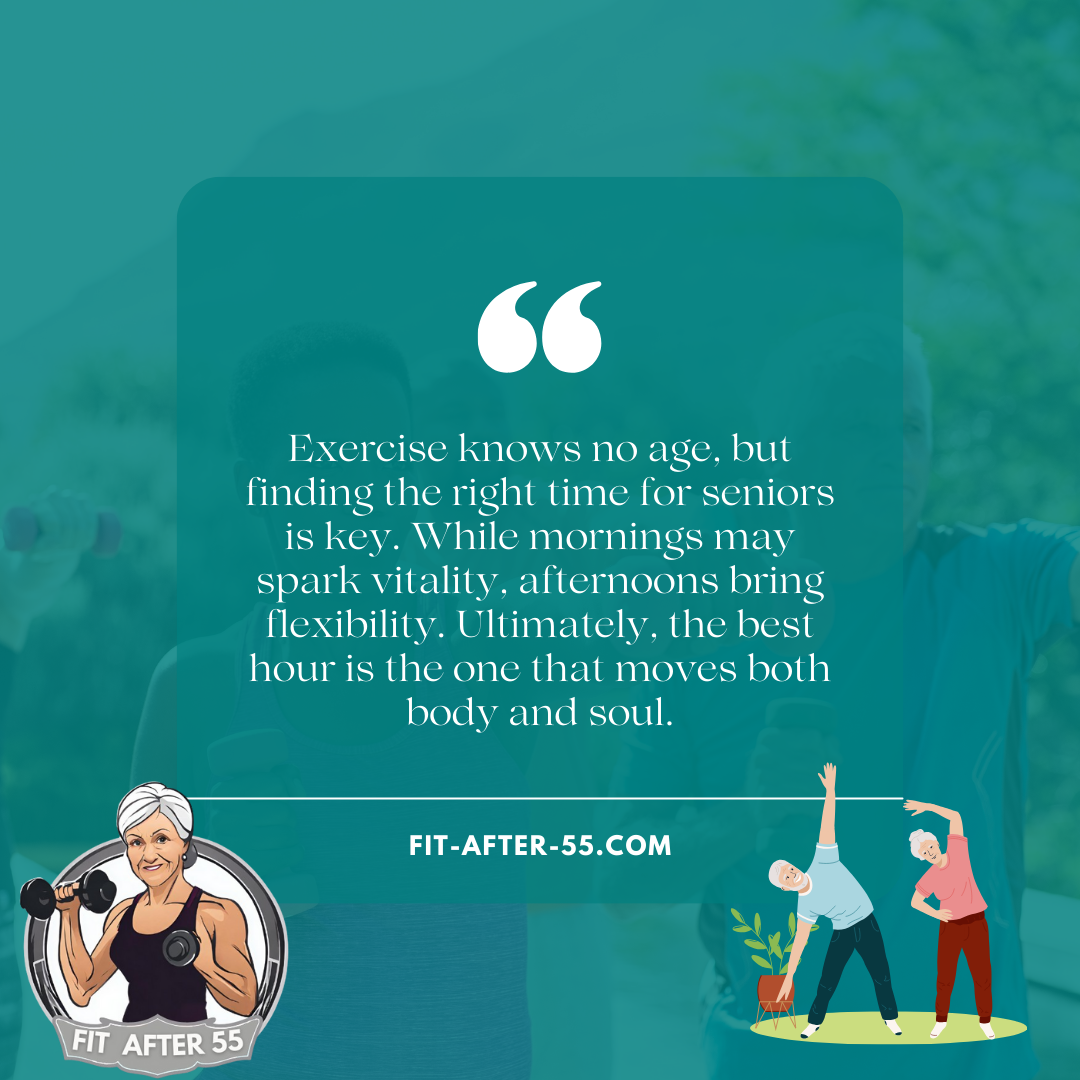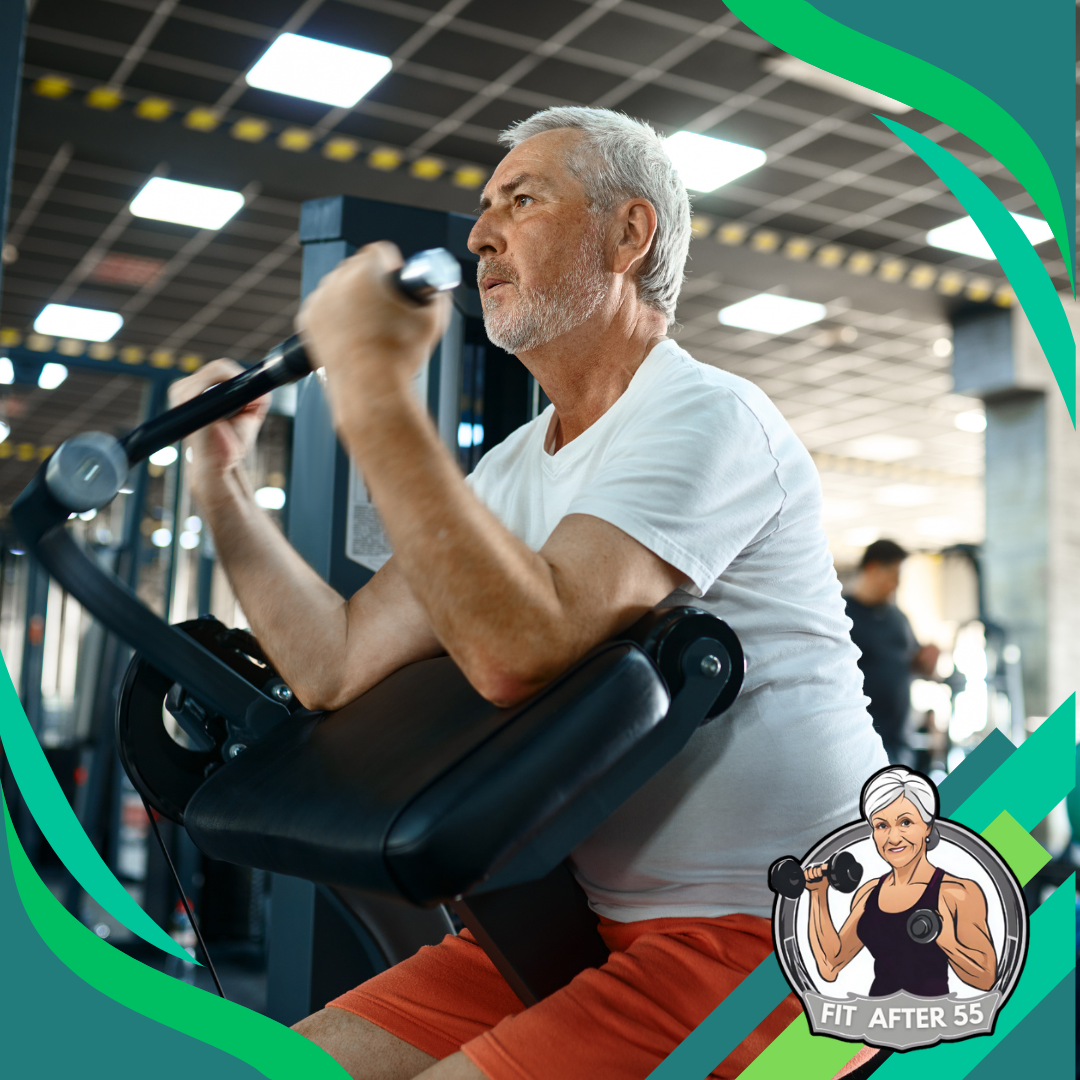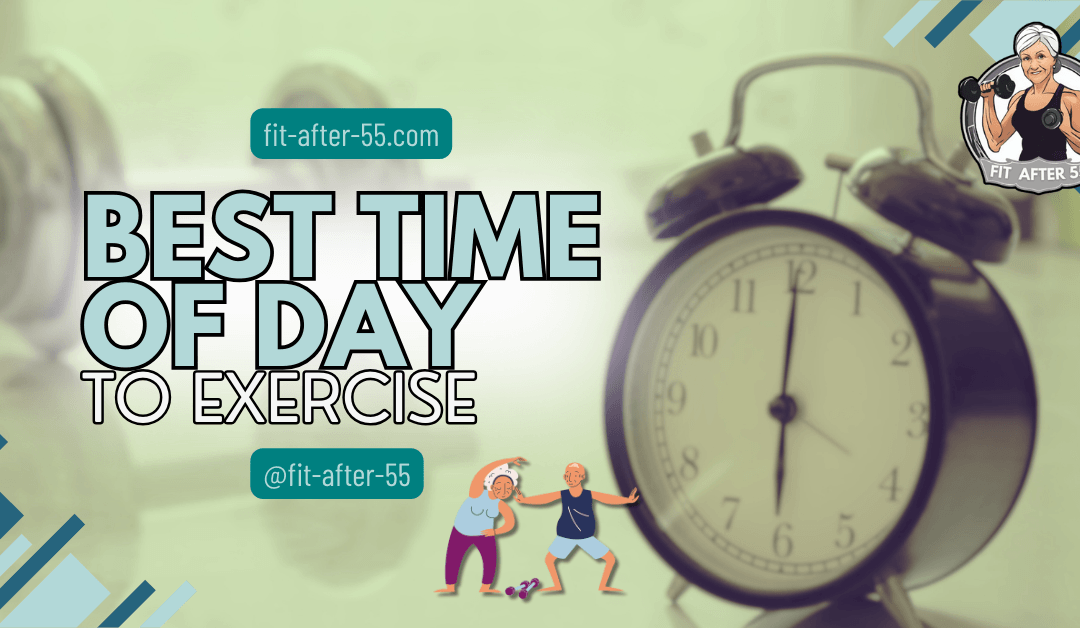Best time of day to exercise?
It’s a question many of us ponder as we strive to optimize our fitness routines. Discovering the ideal time varies for each individual. In this guide, we’ll explore the factors influencing your workout schedule and help you pinpoint the best time to maximize your fitness routine. Let’s dive in!
Best Time of Day To Exercise: Optimizing Your Workout Schedule
Choosing when to exercise is personal and depends on your body’s rhythms.
Your internal clock affects your energy and performance. It’s like your body has its own built-in schedule, dictating when you’re at your peak and when you might need a little extra push.

Morning exercise
Morning workouts boost metabolism and focus, while evenings ease stress. Starting your day with exercise can rev up your metabolism, helping you burn more calories throughout the day. Plus, it sets a positive tone for the hours ahead, sharpening your focus and mental clarity. On the other hand, exercising in the evening can be a great way to wind down after a long day. It’s like giving your body and mind a chance to release any built-up tension or stress, helping you relax and sleep better.
Aligning exercise with your routine maximizes its benefits. By fitting exercise into your daily schedule, you’re more likely to stick with it. Whether you prefer to sweat it out in the morning before the chaos of the day begins or unwind with a workout in the evening, finding the right time for you ensures that you can consistently reap the rewards of physical activity.
Key Takeaways
- Your optimal workout time is influenced by circadian rhythms and personal preferences.
- Morning exercises can boost metabolism, while afternoons may yield peak physical performance.
- Evening workouts might aid in stress relief and fit more easily into daily schedules.

Understanding the Circadian Rhythm
Your body adheres to a biological clock known as the circadian rhythm, which orchestrates your physical, mental, and behavioral changes over a 24-hour cycle.
This rhythm affects your sleep, hormone levels, body temperature, and also plays a crucial role in your exercise routines and performance.

Biological Clock and Exercise
Your circadian rhythm is deeply intertwined with your body’s ability to perform physically.
Timing your workout can leverage this internal clock to enhance exercise effectiveness.
For instance, research indicates that muscle strength and oxidative capacity exhibit fluctuations throughout the day, aligning with your circadian rhythm.
- Morning: Ideal for consistency and leveraging hormone levels that help build muscle.
- Afternoon/Early Evening: Often the peak time for physical performance due to optimal body temperature and coordination.
Chronobiology and Physical Performance
Chronobiology is the study of biological rhythms and their effects on your body.
Physical performance is subject to these rhythms, with variables such as endurance and strength demonstrating significant changes based on the time of day.
Exercise timing might affect your workout quality, recovery, and the potential for muscle growth.
- Strength Training: Optimal in the late afternoon when your muscles are naturally warmer.
- Cardiovascular Workouts: Can be performed effectively in both the morning and evening, though preference and individual rhythm play a role.
Benefits of Morning Exercise
Exercising in the morning can set a positive tone for your entire day. You’ll discover benefits such as an increased metabolism, a higher likelihood of consistency in your workouts, and improvements in mental health.

Boosted Metabolism
When you engage in morning exercise, your body burns more calories throughout the day, a process known as excess post-exercise oxygen consumption (EPOC).
A study mentioned by Forbes suggests that working out in the morning can enhance this effect.
Enhanced Consistency
By scheduling your workouts in the morning, you can develop a stronger routine and make exercise a more stable habit.
Morning exercise can lead to better adherence to fitness regimens due to fewer schedule conflicts that typically arise later in the day, as indicated by research in a 2017 study.
Improved Mental Health
Morning workouts can have a profound impact on your mental health.
They can improve mood and create a positive mindset for the day ahead.
Endorphins, which are released during exercise, can help reduce stress and anxiety, aligning with the benefits outlined by Healthline.
Advantages of Afternoon Exercise
Exercising in the afternoon can take advantage of your body’s natural rhythms, optimizing performance and enhancing your workout results.

Optimal Muscle Function
Your body temperature peaks in the afternoon, which means your muscles are at their most pliable. This reduces the risk of injuries and improves your overall exercise performance.
Studies, including one from the Journal of Physiology, suggest that your body is fully awake and warmed up during this time of day.
Increased Strength and Flexibility
Afternoon workouts may coincide with higher testosterone levels in both men and women, which is beneficial for muscle growth and repair.
Flexibility is also enhanced due to the increased warmth of your body, allowing for a greater range of motion during activities as noted in a Forbes article.
Peak Reaction Time
Your reaction time tends to be quicker in the afternoon due to the heightened alertness and cognitive function.
This can lead to better performance in high-speed and complex exercises, as your body can respond more efficiently to the demands of your workout regimen.
Evening Workouts and Their Perks
Evening workouts can offer unique benefits that cater specifically to your post-workday needs. They provide an excellent outlet for releasing stress and may allow for more intense exercise sessions without the rush of a morning timetable.

Stress Relief After Work
After a long day at work, hitting the gym or going for a run can be an effective way to alleviate stress.
Physical activity increases the production of endorphins, your body’s feel-good neurotransmitters, and can also serve as a form of meditation in motion, helping you shed your day’s worries.
Potential for More Intense Sessions
During the evening, your body temperature is higher, which can improve muscle function and strength, enhance endurance, and lower the risk of injuries.
This physiological state makes it possible for you to engage in more intense workout sessions compared to other times of the day.
No Time Constraints
Unlike morning workouts, during the evening you typically face less pressure to finish quickly to make room for other commitments.
This lack of strict time constraints might enable you to have longer, uninterrupted workouts, ensuring you can complete all parts of your exercise routine thoroughly.
Assessing Personal Preferences and Lifestyle

In deciding the best time of day to exercise, it’s imperative that you consider your individual circumstances and how they mesh with your exercise regimen.
Work and Family Obligations
You need to consider the structure of your daily routine.
Are your mornings hectic with getting kids ready for school or are your evenings filled with late work meetings?
Schedule your workouts at a time when you are least likely to be interrupted or when you can consistently commit to being active.
Personal Energy Levels
It’s crucial to monitor when you feel most energized.
Some people are full of vigor in the mornings, while others may find their energy peaks during the afternoon or evening.
Align your workouts with these energy surges to ensure you are exercising efficiently and effectively.
Fitness Goals Alignment
Your fitness objectives play a pivotal role in deciding when to train.
For instance, if your goal is weight loss, morning exercise may help you lose more weight than exercising at other times.
Conversely, if you are eyeing performance improvements, consistency in the time of day you train could be more beneficial.
Impact of Exercise Type on Timing
When planning your workout, it’s crucial to consider how different types of exercise may yield optimal results at varying times of the day, aligning with your body’s physiological rhythms.
Cardiovascular Training
For cardiovascular workouts, engaging in these exercises during the morning hours may be associated with lower blood pressure and improved sleep patterns.
Your body’s higher cortisol levels in the morning can help turn these workouts into strong, consistent habits.
Exercising in the morning may also jump-start your metabolism, aiding in calorie burn throughout the day.
Strength Training
For strength training, afternoon or evening sessions might be more effective.
Studies suggest that your body is warmer later in the day, which can lead to better performance and fewer injuries.
You may also have increased muscle function and strength, as well as a higher pain tolerance in the later hours of the day.
Flexibility and Mobility Workouts
When you’re focusing on flexibility and mobility, the time of day may be less critical. However, engaging in these types of exercises when your muscles are warmed up can reduce the risk of injuries and improve your range of motion.
For many, this may mean that post-cardio or post-strength training sessions are ideal times for mobility work. Alternatively, late afternoon or early evening when the body’s temperature peaks can also be beneficial.
Scientific Findings on Exercise Timing
Determining the optimal time to exercise involves understanding how different times of day can affect your physical performance and health outcomes.
Research on Morning vs Evening Workouts
Morning exercise may kickstart your metabolism and improve your mood for the day ahead. A study highlighted in the Washington Post found that morning workouts can positively influence weight management.
In contrast, evening workouts, as detailed in The New York Times, may have unique benefits for cholesterol levels and blood sugar control, especially in individuals with a high-fat diet.
Hormonal Influences on Performance
Your hormone levels fluctuate throughout the day, affecting your exercise performance. Cortisol, the stress hormone that helps control blood sugar levels, has its peak in the morning, possibly enhancing your performance during a.m. workouts.
On the other hand, better muscle function and endurance have been linked to higher evening levels of testosterone in males.
Sleep Quality and Exercise Timing
The relationship between sleep quality and exercise timing can be bidirectional. Morning exercise has been associated with deeper sleep cycles, while a workout too late in the evening might interfere with sleep due to increased alertness.
However, this can vary greatly among individuals, suggesting the need for personal experimentation with workout timing.
Practical Tips for Choosing the Right Time to Exercise
When selecting the best time to exercise, consider your personal schedule and circadian rhythms to ensure consistency and optimize performance.
- Acknowledge Your Body Clock: Tune into your body’s natural energy fluctuations. If you’re a morning person, you might benefit from starting your day with a workout. Exercise can help improve quality sleep at night.
- Weigh Work & Life Commitments: Pick a time when interruptions are least likely. Morning workouts can be great for dodging daytime distractions.
- Monitor Exercise Intensity: Evening workouts should be more moderate if you experience sleep disturbances. High-intensity exercise too close to bedtime may lead to poor sleep quality.
- Temperature Matters: Your body temperature peaks in the afternoon, often resulting in optimal performance. A late afternoon or early evening workout could be your best time.
- Be Consistent: Regardless of the time you choose, try to stick with it. Routine helps your body adapt and perform better.
| Time of Day | Considerations |
|---|---|
| Morning | Kickstart metabolism, fewer distractions |
| Afternoon | Peak body temperature, improved strength |
| Evening | Wind down, prepare for rest |
Best Time of Day to Exercise: Finding Your Perfect Fit
It’s clear that the best time to exercise varies from person to person. We’ve explored how factors like circadian rhythms, lifestyle commitments, and personal energy levels play into this decision.

Morning workouts can jumpstart your metabolism and set a positive tone for the day, while afternoon sessions take advantage of peak physical performance. Evening exercise offers stress relief and flexibility in scheduling.
However, what works for one person may not work for another, and preferences can change over time. Despite this, consistency remains crucial.
So, as you carve out your fitness routine, listen to your body, consider your daily schedule, and choose a time that suits you best. Whether it’s a sunrise sweat session, a lunchtime power walk, or an after-dinner dance class, find what feels right for you and stick with it.
What’s your go-to workout time? Share in the comments below and keep moving towards your fitness goals!
Frequently Asked Questions
When seeking to optimize your exercise routine, consider the influence of the time of day on both your body’s physiology and your personal schedule to ensure sustained commitment and maximum benefits.
What factors should be considered for determining the optimal time for a workout to maximize weight loss?
Your body’s circadian rhythms, hormone levels, and personal energy fluctuations all play a role in identifying the best time to exercise for weight loss. Consistency is key, so choose a time you can stick with regularly.
How does the time of day affect the efficiency of a workout for gaining muscle?
Are there specific benefits associated with exercising in the morning compared to the evening?
Morning exercise is linked to more consistent sleep patterns and potentially enhanced metabolism. It can also promote increased energy levels and focus for the day ahead, as suggested by research on metabolic health.
Can the timing of your exercise routine significantly impact fat loss, particularly belly fat?
While overall calorie deficit remains the primary driver for fat loss, timing can influence hormones related to appetite and fat distribution. Morning may be advantageous for regulating appetite and potentially targeting belly fat, but consistency is crucial.
What are the best workout times for women with different fitness goals?
For women, choosing a workout time should align with personal goals, energy levels, and lifestyle.
Morning workouts might favor weight loss and overall consistency, while evening workouts could benefit those aiming for strength gains and stress relief after a day’s work.
Join Our Thriving Community for Elderly Fitness & Wellness!
Explore our official website at fit-after-55.com and connect with us on Facebook: Facebook.com/FitAfter55
Discover engaging content, insightful product reviews, and join a vibrant community committed to the well-being of seniors and young people alike!

